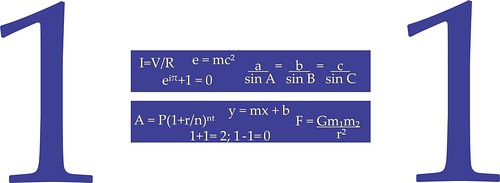
In the graphic above, there are ten important equations, some apparently simple, some not so simple.
Equal: Agreeing in quantity, size, quality, degree, value,
etc.; having the same magnitude, the same value, the same degree, etc. - from
Webster's Unabridged Dictionary, Project Gutenberg, public domain
The equals sign, which we now take for granted, was first
used in 1557, by a Welsh mathematician named Robert Recorde. (See the Wikipedia article on the equals sign.)
Equations used are these: three equations from “simple” arithmetic; Ohm’s
law; Einstein’s energy/mass equivalence equation; Euler’s equation; the law of
Sines; An equation for compound interest; Slope-intercept formula for a
straight line; Newton’s law of universal gravitation.
The largest equation in the graphic, from "simple
arithmetic" illustrates one of the main ideas of arithmetic, namely that a
thing is equal to itself. Another one uses a zero, which symbol and concept we now take for granted. Zero was
invented in India in the 9th century AD.
Euler's equation, also known as Euler’s identity, relates perhaps the most
important constants of mathematics, e, pi and i, the square root of minus one.
There are other ways of representing compound interest, depending on the
situation, but the equation used will cover many of them. The law of Sines has
been used in astronomy, to measure distances of bodies within the solar system
from the earth.
Two of the most important statements in English that use the
word equal are:
Philippians 2:6 Who, being in the form of God, thought it
not robbery to be equal with God: 7 But made himself of no reputation, and took
upon him the form of a servant, and was made in the likeness of men: (King
James version)
and
We hold these truths to be self-evident, that all men are
created equal, that they are endowed by their Creator with certain unalienable
Rights, that among these are Life, Liberty and the pursuit of Happiness. - U.
S. Declaration of Independence (I know. At the time, all men weren’t considered
equal, and women weren’t included. But it was, and is, a great idea.)
Thanks for looking, and, perhaps, thinking. The graphic is a link to a Flickr page, where larger sizes of it should be available.

